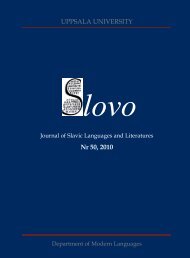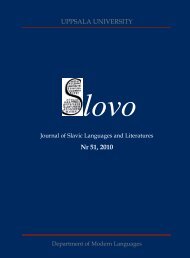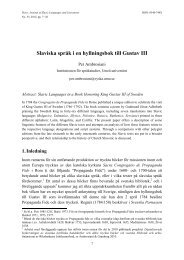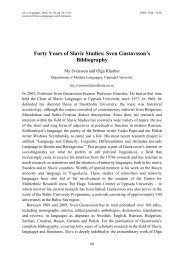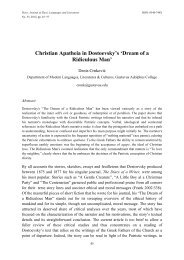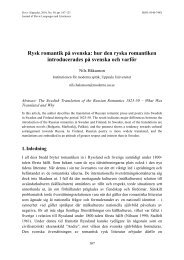Full text PDF - Index of - Uppsala universitet
Full text PDF - Index of - Uppsala universitet
Full text PDF - Index of - Uppsala universitet
You also want an ePaper? Increase the reach of your titles
YUMPU automatically turns print PDFs into web optimized ePapers that Google loves.
Slovo.<br />
Journal <strong>of</strong> Slavic Languages and Literatures<br />
inclusion relation: on every day t’ there is a visit e, such that e is temporally included<br />
in t’: e t’. In other words, we have a “perfective complete event interpretation”. 8 In<br />
this respect example (34) is particularly transparent because <strong>of</strong> the overt quantifier<br />
každyj den' (“every day”), which gives us the relevant subintervals <strong>of</strong> the habitus. One<br />
should bear in mind that this quantification over times is <strong>of</strong>ten covert (con<strong>text</strong>ually<br />
given).<br />
We can also have constructions involving two imperfective operators: one that<br />
applies to the habitus, and one which operates locally on the VP. In the following<br />
example from Czech 9 we have an imperfective stative verb co-occurring with the<br />
imperfective-habitual suffix “-va”. So, the two imperfective operators are overtly<br />
expressed. In most languages this double aspect marking <strong>of</strong> a finite verb is not<br />
available. The Russian translator has somehow solved this conflict by adding the verb<br />
“ljubil – loved to”, which conveys the habitus <strong>of</strong> lying on the grass. In the English<br />
translation the imperfective is not expressed through verbal morphology, but the<br />
combination <strong>of</strong> two temporal when-clauses in one and the same sentence points to the<br />
two aspectual relations in question:<br />
(36) Jako kluk jsem lehával[up, uipf, uhab] u tety na venkově v noci na trávě. (Jan<br />
Otčenášek, “Romeo, Julie a tma”) (Czech)<br />
(37) Я еще мальчишкой у тетки в деревне любил[up, uipf] лежать[uipf] по<br />
ночам в траве.<br />
(38) When I was little I used[up] to lie on the grass at night when I was staying at<br />
my aunt’s in the country.<br />
(39) Som liten gutt, da jeg var på besøk på landet hos tante, pleide[up] jeg å ligge i<br />
gresset om natten. (Norwegian)<br />
A comparison with other Slavic languages shows support for the structure assumed<br />
here, namely the split <strong>of</strong> aspect into two operators. Consider again the case <strong>of</strong><br />
(“perfective”) complete events instantiated at subintervals <strong>of</strong> the (“imperfective”)<br />
habitus. As we saw above, Russian typically resolves this conflict in favour <strong>of</strong> the<br />
imperfective aspect. However, in Slavic languages such as Czech, Slovak and Slovene<br />
the conflict is resolved differently with perfective marking <strong>of</strong> the verb (Mønnesland<br />
1984). Finally, Bulgarian, which displays an interesting mixture <strong>of</strong> Slavic type and<br />
Romance type aspect, provides us with the desired configuration. In the following<br />
example from Maslov (1959), the verb is lexically marked for perfectivity (complete<br />
events) and imperfect tense (imperfective habitus): 10<br />
8 Covert semantic operators (here: PF) do not necessarily interact with morphological u-features (here [uipf]),<br />
but we must assume that the PF-operator does not block the feature transmission from the higher imperfective<br />
operator [iipf].<br />
9 The example is taken from the Czech parallel corpus Intercorp http://www.korpus.cz/intercorp/?lang=en.<br />
10 True, this configuration is restricted in Bulgarian to subordinate clauses. I thank Svetlana Krasikova and Kjetil<br />
Rå Hauge for discussion <strong>of</strong> this point.<br />
72



